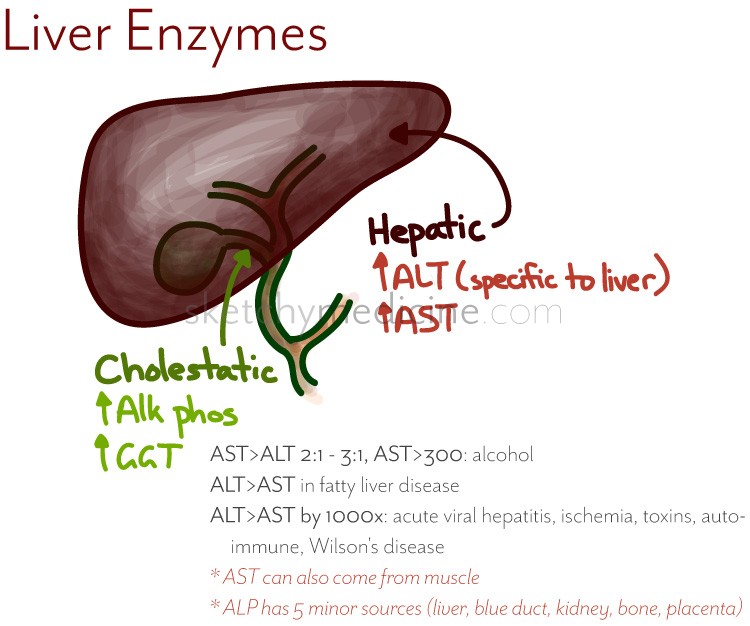
Liver Enzymes: What Causes Liver Enzymes to Elevate?
What Causes Liver Enzymes to Elevate?
Tests that measure liver enzymes are blood tests that specify how much of the special protein that makes up liver enzymes is present in the liver. This enzyme increases the liver’s chemical reactions in order to measure the functions that the liver performs. These include such functions as excretion, metabolism, blood clotting and filtration.
An elevation in the liver enzymes indicates that the liver cells may be damaged or inflamed or that the gallbladder and the bile ducts might be obstructed. This is known as obstruction to the biliary tract. When this happens, it is an indication that the damaged or inflamed cells are leaking elevated quantities of chemicals into the bloodstream. This is what causes the values of liver enzymes to be higher than normal in the test results.
The specific elevated liver enzymes most commonly found are:
Alanine transaminase (ALT)
Aspartate transaminase (AST)
What causes liver enzymes to elevate?
Liver enzymes can become elevated for various reasons, including the abuse of drugs or alcohol. An elevation might also indicate a certain disease, such as cirrhosis of the liver, scarring of the liver, or hepatitis, either viral or autoimmune. The use of any medicine that is metabolized by the liver can also cause elevated liver enzymes, though the liver enzymes will revert to normal once one the medication is ceased.
Other causes of elevated liver enzymes include Wilson’s disease, in which a person has excess copper in the liver, or hemochromatosis. This is a disease in which there is an excess of iron in the liver. Another cause of elevated enzymes is an unhealthy diet. Celiac disease, diabetes and simple infections might also account for high liver enzyme values. An elevation in liver enzymes could also indicate that there are fatty deposits on the liver which should not be there.
Liver function tests, or LFTs, measure bilirubin and ammonia, as well as the presence of liver disease or liver malfunction. The liver is one of the body’s most valuable and important organs. It is the organ that purifies the blood of toxins and gets rid of those toxins in excretions of bile.
Most standard liver function tests measure four liver enzymes. These are AST or SGOT, aspartate transaminase, which is an enzyme that metabolizes the amino acid alanine and AP and GGT, which are both called cholestatic liver enzymes.
In addition, ALT, alanine transaminase is an enzyme that metabolizes protein in the liver. If there is damage to the liver, ALT leaks into the bloodstream.
ALP (alkaline phosphatase) is a liver enzyme that causes certain normal chemical reactions to keep the liver, bones and kidneys healthy. An elevation of transaminases can be caused by any of the numerous conditions. These include heart disease, viral or autoimmune hepatitis, a fatty liver, herbal toxicity, a tumor of the liver, alcoholism, liver disease caused by drugs or medication or a genetic liver disease
Among possible reasons for elevated cholestatic liver enzymes are gallstones, a liver tumor, drug-induced liver disease, liver disease caused by alcoholism, nonalcoholic fatty liver disease, also known as NAFLD, cirrhosis or primary sclerosing cholangitis.
Certain prescription medications, including statin drugs used to control cholesterol
Hepatitis A
Hepatitis B
Hepatitis C
Nonalcoholic fatty liver disease
Obesity
Over-the-counter pain medications, including acetaminophen
Other causes of elevated liver enzymes may include:
Alcoholic hepatitis
Autoimmune hepatitis
Celiac disease
Cirrhosis
Cytomegalovirus infection
Dermatomyositis
Epstein-Barr virus
Gallbladder inflammation
Heart attack
Hemochromatosis
Hypothyroidism
Liver cancer
Mononucleosis
Muscular dystrophy
Pancreatitis
Polymyositis
Toxic hepatitis
Wilson’s disease
Other liver enzymes that can become elevated are GGT (gamma glutamyl transferase) which transfers chemicals among molecules to keep the liver bile ducts normal, and LDH (lactate dehydrogenase). This enzyme is found in blood and tissue and is responsible for cells producing energy.
If liver enzymes are elevated, it does not necessarily mean that the person has a particular liver disease. Medical professionals will typically wish to perform further tests to determine the actual cause of the elevation in the liver enzymes. Some additional tests that might be performed include an ultrasound of the liver, a CAT scan (computed axial tomography), a liver biopsy and further liver blood work.
If a liver function test reveals you have elevated liver enzymes, ask your doctor about what your test results might mean. Your doctor may suggest you undergo other tests and procedures to determine what’s causing your elevated liver enzymes.